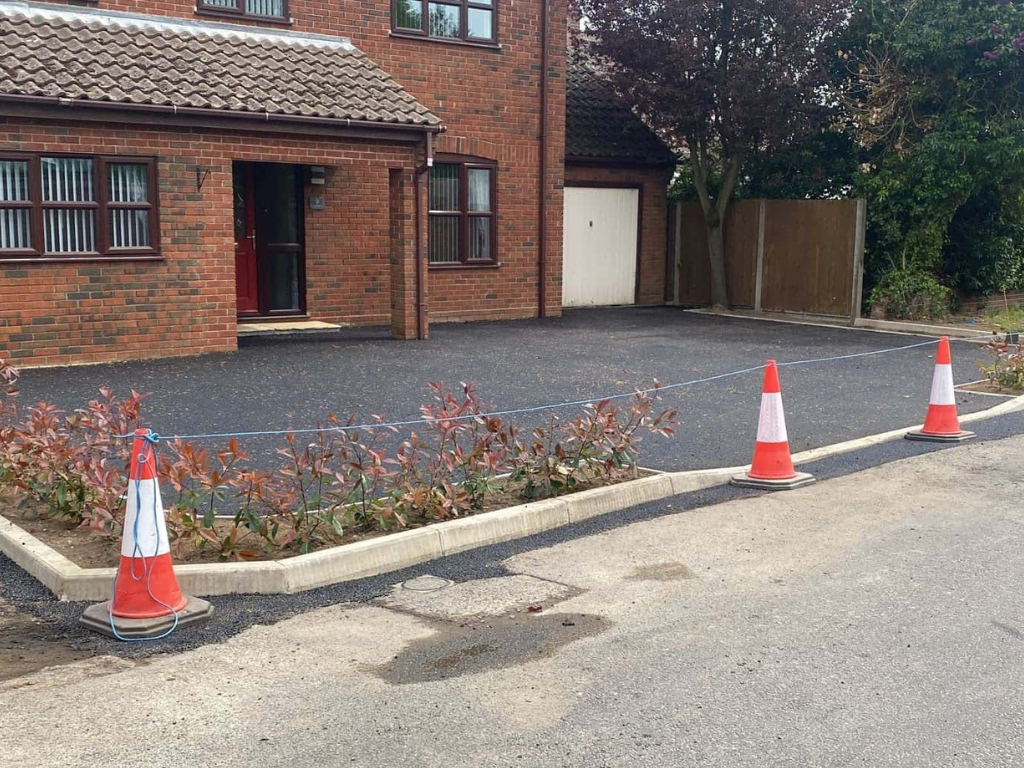Pros and Cons of Asphalt Driveways
Introduction: At Wymondham Driveway Contractors, we aim to provide detailed, practical information to help you make informed decisions about your driveway. Asphalt driveways are a popular choice for many homeowners due to their affordability and ease of installation. However, like any material, asphalt has its advantages and disadvantages. In this blog post, we’ll explore the pros and cons of asphalt driveways to help you decide if they’re the right choice for your property.
Pros of Asphalt Driveways
- Cost-Effective
- Affordability: One of the most significant advantages of asphalt driveways is their lower cost than concrete or block paving materials. The initial installation cost is generally more budget-friendly, making asphalt an attractive option for managing expenses.
- Quick Installation
- Speed: Asphalt driveways can be installed relatively quickly. Depending on the size of the driveway, the installation process usually takes a day or two, allowing you to use your new driveway sooner than some other materials.
- Durability
- Strength: Asphalt driveways can be quite durable when properly installed and maintained. They are designed to withstand heavy traffic and harsh weather conditions, making them a reliable choice for many homeowners.
- Low Maintenance
- Ease of Upkeep: Asphalt driveways require less maintenance than other materials. Regular sealing (typically every 2-3 years) can extend the lifespan of the asphalt and keep it looking fresh.
- Smooth Surface
- Comfort and Functionality: Asphalt provides a smooth surface that is easy to drive on and comfortable for walking. It also reduces the risk of stones or debris being tracked into your home.
- Flexibility
- Adaptability: Asphalt can be adapted to various shapes and sizes, making it a versatile choice for driveways. It can be easily resurfaced if needed, providing a fresh look and extending the driveway’s lifespan.
Cons of Asphalt Driveways
- Shorter Lifespan
- Durability Concerns: While asphalt driveways are durable, they typically have a shorter lifespan compared to concrete or block paving. They may need to be replaced or resurfaced more frequently, especially in areas with extreme weather conditions.
- Weather Sensitivity
- Temperature Effects: Asphalt can be affected by extreme temperatures. It may soften and become sticky in hot weather, while in cold weather, it can become brittle and prone to cracking.
- Maintenance Requirements
- Regular Sealing Needed: Asphalt requires regular sealing to maintain its appearance and durability. Neglecting this can lead to cracks and deterioration, which can become costly to repair.
- Susceptibility to Stains
- Oil and Chemical Stains: Asphalt driveways are more prone to staining from oil spills, chemicals, and other substances. These stains can be challenging to remove and may affect the overall appearance of the driveway.
- Appearance
- Aesthetic Limitations: While asphalt is functional, it offers a different aesthetic appeal than other materials like block paving or decorative concrete. It generally has a more utilitarian appearance, which may only suit some styles of homes.
- Environmental Impact
- Material Concerns: Asphalt production involves petroleum products, which have environmental implications. Additionally, the surface may retain heat, contributing to the urban heat island effect.
Conclusion: Asphalt driveways offer several benefits, including affordability, quick installation, and durability. However, they also have drawbacks, such as a shorter lifespan, maintenance requirements, and environmental concerns.
Call us on: 01953 660 780
Click here to find out more about Wymondham Driveway Contractors
Click here to complete our contact form and see how we can help you with your driveway needs.

